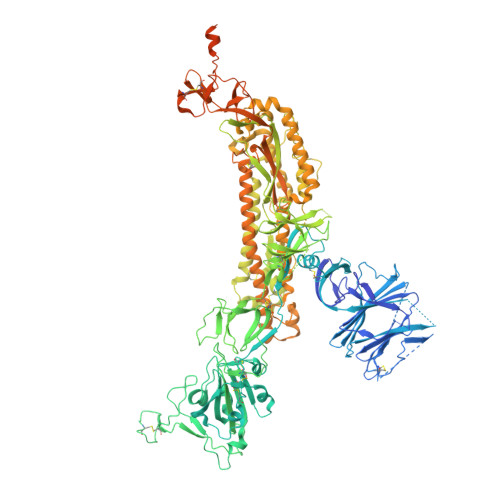Effect of natural mutations of SARS-CoV-2 on spike structure, conformation, and antigenicity.
Gobeil, S.M., Janowska, K., McDowell, S., Mansouri, K., Parks, R., Stalls, V., Kopp, M.F., Manne, K., Li, D., Wiehe, K., Saunders, K.O., Edwards, R.J., Korber, B., Haynes, B.F., Henderson, R., Acharya, P.(2021) Science 373
- PubMed: 34168071
- DOI: https://doi.org/10.1126/science.abi6226
- Primary Citation of Related Structures:
7LWI, 7LWJ, 7LWK, 7LWL, 7LWM, 7LWN, 7LWO, 7LWP, 7LWQ, 7LWT, 7LWU, 7LWV, 7LWW, 7LYK, 7LYL, 7LYM, 7LYN, 7LYO, 7LYP, 7LYQ - PubMed Abstract:
Severe acute respiratory syndrome coronavirus 2 (SARS-CoV-2) variants with multiple spike mutations enable increased transmission and antibody resistance. We combined cryo-electron microscopy (cryo-EM), binding, and computational analyses to study variant spikes, including one that was involved in transmission between minks and humans, and others that originated and spread in human populations. All variants showed increased angiotensin-converting enzyme 2 (ACE2) receptor binding and increased propensity for receptor binding domain (RBD)-up states. While adaptation to mink resulted in spike destabilization, the B.1.1.7 (UK) spike balanced stabilizing and destabilizing mutations. A local destabilizing effect of the RBD E484K mutation was implicated in resistance of the B.1.1.28/P.1 (Brazil) and B.1.351 (South Africa) variants to neutralizing antibodies. Our studies revealed allosteric effects of mutations and mechanistic differences that drive either interspecies transmission or escape from antibody neutralization.
Organizational Affiliation:
Duke Human Vaccine Institute, Durham, NC 27710, USA.















